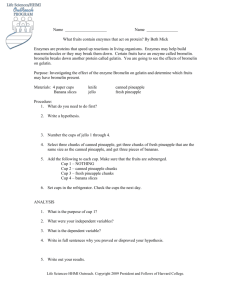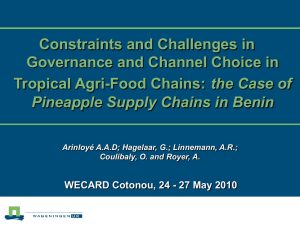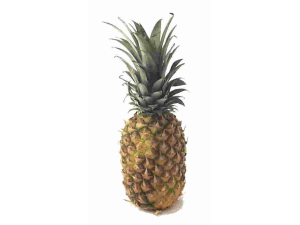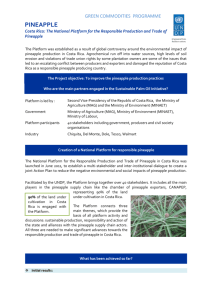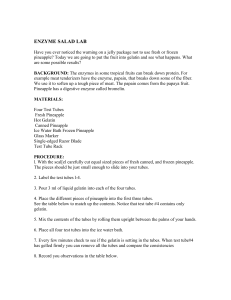DESIGNING A PINEAPPLE MACHINE 7ULKURNAIN BIN SALIM
advertisement
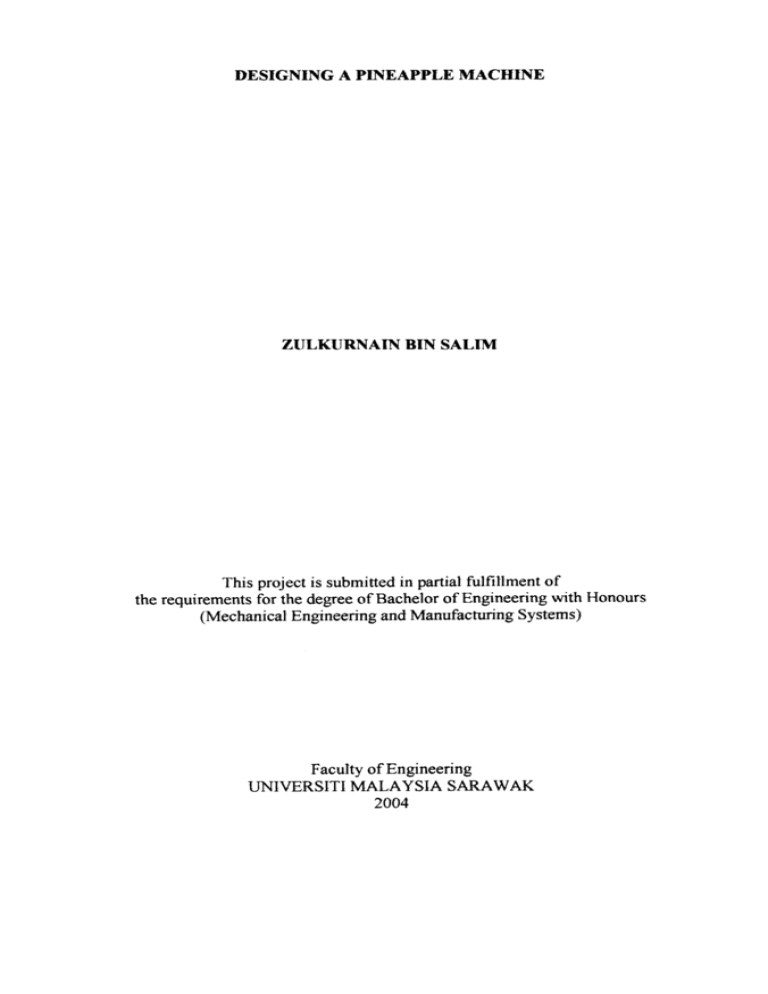
DESIGNING
A PINEAPPLE
7ULKURNAIN
MACHINE
BIN SALIM
This project is submitted in partial fulfillment of
the requirements for the degree of Bachelor of Engineering with Honours
(Mechanical Engineering and Manufacturing Systems)
Faculty of Engineering
UNIVERSITI MALAYSIA SARAWAK
2004
ACKNOWLEDGEMENTS
Alhamdulillah,
Thank God for all His blessing and permission I was able to
like
foremost
I
First
Project.
to take this
Final
Year
this
would
and
complete
for
Tambi
Ghazali
Dr.
Rash
En.
Muslimen
to
thank
and
my supervisors,
opportunity
their valuable advices, their patience and willingness to assist me completes this
like
been
finished.
I
is
have
to
Without
the
their
would
never
support,
work
report.
for
father,
their
thanks
to
parents
my
and
my
my
mother
mention my special
for
forever
in
life.
I
to
them
grateful
am
my
continuous encouragement and support
that.
I would like to thank Mr Masri and Mr Rhyier and other lab technicians for
helpful
been
have
They
information.
exceptionally
always
their technical advice and
for
idea
in
developing
this
faced
the
I
project.
problem
any
whenever
i
Designing A Pineapple
Machine
Zulkurnainbin Salim
ABSTRACT
The purpose of this study is to learn about the operation of pineapple machine and
few
do
To
this
the
pineapple machines are
project,
a
new
machine.
redesigned
information,
From
learn
this
the
to
new
pineapple
machine.
main
process
of
studied
be
fulfill
the user needs. The existing machines are too
to
redesigned
machine will
for
So,
in
the redesigned machine,
term
and
not
efficient.
of
operation
complicated
the improvement is made so that it is easy to use and at the same time improved the
determine
is
Besides
to
the
made
analysis
redesigning,
machine.
whole operation of
its capability to operate in a desired condition. As a result of this study, an improved
has
been
the
and
coring
operation of slicing
pineapple machine which performs
designed.
11
Merekabentuk
Mesin Nanas
Zulkurnainbin Salim
Abstrak
Projek ini adalah bertujuan untuk mengkaji operasi beberapa jenis mesin nanas dan
merekabentuk semula sebuah mesin baru. Bagi melaksanakan projek ini, beberapa
mesin nanas dikaji untuk mengetahui proses utama bagi mesin nanas. Daripada
maklumat yang tersebut, mesin yang baru direkabentuk untuk memperbaiki mesin
yang sedia ada untuk memenuhi kehendak pengguna. Mesin yang sedia ada terlalu
komplikateddari
segi operasi dan tidak cukup efisyen. Oleh itu, bagi mesin yang
direkabentuk semula ini perlu dibuat supaya senang digunakan dan pada masa yang
sama memperbaiki operasi keseluruhan mesin. Selain merekabentuk, analisis dibuat
keadaan
diingini.
beroperasi
dalam
keupayaannya
untuk menentukan
yang
untuk
Hasil rekabentuk yang diperolehi ialah mesin nanas yang dapat melakukan proses
menghiris dan mengupas.
111
Table of Contents
Page
Contents
1
ACKNOWLEDGEMENTS
11
ABSTRACT
ABSTRAK
iii
CONTENTS
iv
LIST OF FIGURE
vi
viii
LIST OF TABLE
1
INTRODUCTION
1.1. Introduction
1
1.2. Problem statement
2
1.3. Aims and Objectives
3
1.4. Scope
3
1.5. Summary
4
2. LITERATURE
5
REVIEW
2.1. Overview of PineappleMachine
5
2.2. PineappleProcessing
6
2.3. PineappleDescription
7
2.4. SamarahanPineapple
9
2.5. Review on Ginaca Machine
10
2.5.1. The Synchronization of Ginaca machine
iv
11
2.6. Pineapple Machines Today
13
2.7. PineappleMachine In Samarahan
17
2.8. Summary
19
20
3. METHODOLOGY
21
3.1. Basic Step In designing
3.1.1. Study on relevant subject
21
3.1.2. Design The Machine
22
3.1.3. Design Analysis
29
3.1.4. Material Selection
40
3.2. Summary
41
4. DISCUSSION
43
4.1. Pineapple Parameter
43
4.2. Existing Machine
45
4.3. Concept Generation
51
4.4. Evaluation of Concept
58
4.5. Redesigned Machine
60
4.6. Design Analysis
65
4.7. Comparison of the existing machine (improved features)
76
4.8. Summary
76
5. CONCLUSION
AND RECOMMENDATION
77
6. REFERENCES
79
7. APPENDICES
82
V
LIST OF FIGURE
PAGE
FIGURE
NUMBER
Figure 1.1
An officer of IADP Samarahan
3
Figure 2.1
Smooth Cayenne pineapple
8
Figure 2.2
Basic model of Ginaca machine
11
Figure 2.3
1919 model Ginaca
12
Figure 2.4
1925 Ginaca machine
12
Figure 2.5
ELLIOT HAND-OPERATED
SLICER
14
Figure 2.6
SINGLE KNIFE PINEAPPLE SLICER
15
Figure 2.7
FILTER CENTRIFUGES
16
Figure 2.8
Squeezer machine that is used to produce pineapple cordial
17
Figure 2.9
Some part in squeezer machine
18
Figure 3.1
Basic steps in design
20
Figure 3.2
Example of contradiction table
27
Figure 3.3
Example of comparison table
28
Figure 3.4
Shaft parameters
30
Figure 3.5
Portion of double-strand roller chain
32
Figure 3.6
General properties of steel
41
Figure 4.1
Pineapple parameter
44
Figure 4.2
Elliot Hand-operatedslicer
45
Figure 4.3
Explosive diagram of Elliot hand-operated slicer
46
Figure 4.4
Concept I
54
V1
Figure 4.5
Concept 2
55
Figure 4.6
Concept 3
56
Figure 4.7
Redesignedmachine
60
Figure 4.8
Explosive diagram of redesigned machine
61
Figure 4.9
Physical decomposition
62
vii
LIST OF TABLE
PAGE
TABLE
NUMBER
Table 2.1:
The characteristics of pineapple variety in Samarahan
9
Table 3.1:
Basic design considerations
22
Table 3.2:
Design considerations
23
Table 3.3:
PREFERENCE RATING TABLE
28
Table 3.4:
Service factor for bending
30
Table 3.5:
Service factor for difference conditions
34
Table 3.6:
Horsepower table
36
Table 3.7:
Values of K
38
Table 3.8:
Slow speed factor
39
Table 3.9
Design Considerations
42
Table 4.1:
Specifications of Elliot hand-operated slicer
47
Table 4.2:
Part by part Elliot hand-operated slicer
47
Table 4.3:
Contradiction table
53
Table 4.4:
PREFERENCE RATING TABLE
58
Table 4.5:
The Criterion Comparison Table for AHP
58
Table 4.6:
The Completed. Criterion Weights
59
Table 4.7:
Redesigned machine specifications
62
Table 4.8:
Part by part features of redesigned machine
63
Table 4.9:
Recommended shaft diameters
66
V111
Table 4.10:
Types of chains
71
Table 4.11:
Types of bearing
75
ix
Df: 51G\ING
A PINFAPPLF
MACFiINF.
CHAPTER 1
INTRODUCTION
This chapter described the whole project. First, it describes the area of the study.
Then, a few problems are identified from the existing machines. From the problems
identified, we will bound the scope of the project to be focused on. In addition, the
determined.
be
the
objectives
of
project
aim and
will
1.1
Introduction
Pineapple processing in a large quantity is quite a challenge in manufacturing
industry. But it can be done by using large machine with complex system. This
machine cost a lot of money and this why pineapple processingusually involves big
company with sophisticated machine to perform processessuch as peeling, slicing
and coring.
In this project, a new machine that are capable to process pineapple with low
be
designed.
in
Samarahan
The
Kota
to
will
pineapple
process
cost and suitable
focus is on how we can process pineapple in a large quantity with low cost, with
be
for
the
the
that
to
can
marketed
pineapple
machine
so
simple manual
operate
small industry in Kota Samarahanarea.
The machine that is going to be designed must be simple enough to meet the
requirement for Kota Samarahan.In addition, the machine must be flexible to cope
with the unplanned pineapple planting in Samarahan.For those reasons,the suitable
processare coring and slicing. Coring processinvolves the processof cutting out the
skin of pineapple. Slicing is the processof cutting the pineapplesinto slices. Both of
1
DENIGN ING A P1NI=,-IPPLE=.I\1A('I[iN
E:
the processes can be combined in one machine so that the final product is the
pineapple that has been cored and sliced.
Basically, pineapples in Samarahan are planted not for commercialized purpose.
Most of the farmers in Kota Samarahan are prefer to sell them directly to customers
or sell them to the wholesalers. Because of that, pineapples in Samarahan are planted
in small scale with the unplanned schedule. It is meant that pineapples plant in
Samarahan are depend on the farmers themselves. It causes the unbalanced supply
for pineapples in Samarahan because of the unsynchronized planting.
1.2
Problem Statements
The main purpose in this project is to design new machine for Samarahan area.
This is due to the need for suitable machine in processing pineapple in Samarahan.
Accordings to En. Esuwandi Seruji
the existing machine in market does not fulfill
,
the requirement for Samarahan area in term of capacity of pineapple that can be
large
farmers
Most
by
the
machines
are
scale machine that
of
monthly.
supplied
require about 1000 pineapples every month. This capacity is out of capability of the
farmers in Samarahan. So, it is a requirement to design new machine for small scale
to process pineapple in Samarahan.
According to En. Esuwandi Seruji, an officer at Samarahan IADP most of the
,
farmers in Samarahan are practicing
traditional
ways to plant pineapple. The
plantation of pineapples in Samarahan are unscheduled and the capacity of the
pineapple can not be maintained. Samarahan area need for new machine which are
lower in cost and can be flexible with the capacity of pineapple in Samarahan.
2
pESIGNTNGA
P(NI:.A('PLEM. ACHINI
Figure 1.1 : En. Esuwandi Seruji, an officer at IADP Samarahan who is
responsible for pineapple plantation in Kota Samarahan
1.3
Aims and Objectives
The aim of this project is to design a machine that capable to perform the
process of slicing and coring for Kota Samarahan area for the purpose of small and
medium industry. The objectives of this project are :
"
Learn how the pineapple can be processed by slicing and coring.
"
Find the way or methods to reduce the cost of the machine so that it can be
used in small and medium industry.
1.4
"
Learn the process of designing.
"
Design pineapple machine for slicing and coring.
Scope
This project is focus on designing for a new pineapple machine to fulfill
the
requirement in Samarahan. This machine is designed for the application of farmers in
Kota Samarahan. The criteria that should be considered are the capability of the
3
DESIGNING
A PINEAPPLE MACHINE
farmer in Kota Samarahanto use the machine, cost of the machine and the flexibility
to cope with the capacity.
The machine should suitable with the pineapples in Kota Samarahan in term of
The
be
to
the
that
machine
machine.
can
applied
sizes and weight so
suitable system
should also be suitable for the variety of the pineapple in Kota Samarahan.
1.5 Summary
In this chapter, the purpose of the project is clearly defined to redesigned new
few
improve
A
to
the
machine.
considerationsare taken
existing
pineapple machine
into account in order to improve the machine. The considerations are based on the
problem statementswhich determinethe scopeof the project.
4
DESIGNING
A PINEAPPLE MACHINE
CHAPTER 2
LITERATURE
REVIEW
The purpose of this chapter is to study the parametersthat are involved in this
in
based
The
the
the
that
scope of
on
objectives
are stated the first
project.
project
be
for
The
to
this project. The
studied
relevant subjects are
used as a guide
chapter.
first subject is the pineapple itself that is to be processed.This chapter is also focus
few
For
this
the
examples of
operation
of
pineapple
machine.
purpose,
a
principle
on
is
that
to
the
new pineapple machine
existing pineapple machines are studied realize
going to redesign.
2.1
Overview of Pineapple Machine
Usually pineapple processing machine involves the process of peeling, slicing
for
Each
the
a sophisticated machine to perform the
needs
process
and coring.
of
for
involves
big
in
large
Processing
company
quantity
usually
pineapple
process.
heavy industry which required high capital cost. One of the most popular machines
to process pineapple is GINACA machine. This machine was revolutionized by
Henry Ginaca in 1911 [The American Society of Mechanical Engineers, 1993]. The
revolution of Ginaca machine bring to the increasing of production volume to more
than triple comparedby using manual method that fully depend on the labor.
Ginaca machine was then implemented by DOLE company which is one of the
largest company that produce product based on pineapple. Until now, Ginaca
machine is widely used around the world after the great revolution in 1911 and many
5
DESIGNTNG A PINEAPPLE MACHINE
improvements have been achieved so that it can be applied for heavy industry. Most
of the machines are fully automatedor semi-automatedand used in big factory [The
American Society of Mechanical Engineers, 1993].
2.2
Pineapple Processing
The production of pineapples in industry began in Hawaii because of its natural
has
basaltic soil with hilly terrain (good drainage). Other factor is
that
condition
because of the cheap labors. It produced sugar, a primary ingredient for syrup in
early pineapple packs. Canned pineapple began to be commercialized in 1890. All
the processes utilize hand labor include the processes of peeling, coring and filling
the can. These early factory production rate are about 15 pineapples/minute. The
hired
by
he
James
D.
Dole
to
when
process pineapple was started
using of machine
Henry G. Ginaca (1876 - 1918) to design a machine to peel and core pineapples. As a
Ginaca
had
been
developed
(called
had
the
that
machine
until
now)
machine
result,
tripled the production rate and decrease the direct depend on labor. Current Ginaca
big
100
canners utilize about
and
pineapples/minutes
at
speeds
around
machines run
20 machines/factory. [Mitsui, 2004]
The procedures that had been developed based on classifying the fruit into a
number of grades by diameter centering the pineapple on the core axis and cutting
fruit cylinders to provide slices to fit the No. 1,2 and 2-1/2 can sizes [The American
Society of Mechanical Engineers, 1993].
The basic processin pineapple processinginvolves the processof coring, peeling
and slicing. Coring is done to center the pineapple so that the next process can be
done easily, while the processof peeling is done to cut out the skin and unusedpart
6
DESIGNING A PINEAPPLE MACHINE
from the pineapples.More important processis slicing where the pineapplesare cut
into piecesdependon the way of packaging.
2.3
Pineapple Description
Pineapple is the family member of Bromeliad which embraces about 2,000
species. It is also known as Ananas comosus Men. (syns. A. sativus Schult. f.,
Ananassasativa Lindl., Bromelia ananasL., B. comosa L. ). Usually, pineapple plant
can achieve high around 2 2.5 to 5 ft (0.75-1.5 m). The leaves spreadabout 3 to 4 ft
(0.9-1.2 m). The leaves is green in color or striped with red yellow or ivory. It
,
fleshy
from
flower
joint
forming
juicy,
that
together
cone
shaped,
compound,
plants
fruit to 12 in (30 cm) or more in height. Pineapple is a tropical plant which can grow
in temperature range of 65°-95°F (18.33-45°C). The rainfall that suitable for
in
(1,143
[Morton,
1987]
is
45
mm).
pineappleplanting about
Pineapple can be grouped into four main classesaccording to the international
trade. There are `Smooth Cayenne', `Red Spanish', `Queen' and `Abacaxi'. Type of
is
Thailand
Malaysia
found
in
Sri
Lanka,
be
India,
that
variety of
and
can
pineapple
`Smooth Cayenne'. This pineapple can achieve weight from 1.8- 4.5 kg. Other
(Azores)
Esmeralda
St.
(Hawai),
Michael
Cayenne'
Hilo
`Smooth
and
are
variants of
(Mexico). `Smooth Cayenne' is planted because it is suitable for canning, can be
sliced and has great flavor. [Morton, 1987]
The most famous pineapple in West Indies, Venezuela and Mexico is from class
`Red Spanish'. This pineapple is approved more dependable than other class of
pineapple in that area. The most important thing is this pineapple is suitable for
7
DESIGNING
A PINEAPPLE MACHINE
canning because it is more or less round, orange-red in colour with weight around 3
to 6 1bs(1.36- 2.7 kg). [Morton, 1987]
Figure 2.1 : Smooth Cayenne pineapple [Morton,
1987].
`Mauritius' is a variant of pineapple that can be found easily in Malaysia. It is also
known as `Malacca Queen, `Red Ceylon' and `red Malacca'. This pineapple is quiet
its
kg)
is
3
lbs
(1.36-2.25
5
to
the
and
external
colour
around
weight
small with
yellow.
The second place is taken by `Singapore Red' which also known as `Singapore
Queen'. It's leave is usually all-green in colour and sometimes have a reddish stripe.
The fruit is also quiet small about 3.5 to 5 lbs (1.6-2.25 kg) in weight [Morton,
1987].
Another variant of pineapple that can be found in Malaysia is `Green Selangor'
which also known as `Green Spanish' and `Selassie'. With all-green leaves, it has
flesh
dots
for
with
and
suitable
canning [Morton, 1987].
golden-yellow
8
DESIGNING A PINEAPPLE MACHINE
2.4
Samarahan Pineapple
There are several variety for Samarahanpineapple. The varieties are Morris,
Josapine, N36, Gandul, Sarawak pineapple and Sawit. Therefore, the most
common pineapple in Samarahanis Morris pineapple.
Variety
Weight
Stem
(kg)
(mm)
Amount
of
Acid (%)
Quality of
storage
solidity
(%)
Morris
1.0
24
15.9
0.49
***
Josapine
1.3
28
16.8
0.63
*****
Sarawak
2.2
28
13.7
0.61
***
Table 2.1 : The characteristics of pineapple variety in Samarahan.
[MARDI, 1998]
Key : *****
*=
= very good
bad
Most of the pineapplesin Samarahanare sold directly to the customer.There is no
industry to commercialize the pineapple in Samarahan.But when there are surplus of
is
that
the
supplied
to
machine
they
are processed produce cordial using
pineapples,
by IADP Samarahan.It is dependson the farmers themselveswhether to processthe
pineappleto produce cordial or not.
9
DESIGNING
2.5
A PINEAPPLE MACHINE
Review on Ginaca machine
The production of pineapple for commercialized was startedabout 1890 in Hawai.
The processis fully man-power which was neededfor high labor.It becomeschange
when the pineapple machine is introduced into the industry which strongly increases
the production rate. But, the requirement for the high labor was still the issue. This
issueneededfor automatedpineapplemachine as a solution.
The operation of Ginaca machine is basically involves the process to center the
pineapple on the core ; cut out a fruit cylinder ; eradicatethe crush andjuice material
; cut off the end ; and remove the central fibrous core. In early when the machine was
innovated, it can process 50 pineapples per minute manually and needed for high
labor.
Ginaca is a combination of separateddevices. First part is consisted of a chain
provided with pusher, a centering head and a stationary sizing knife. Second part
consistedof a six-pocket turret mechanism.Third part consisted of a skin eradicator
to remove the juice material.
After the innovation of basic Ginaca machine in 1911, there were some
improvement that were achievedto increasethe capacity of the machine and decrease
the neededfor high labor. The important achievementwere happenedon 1919., 1925
Ginaca
included
improvements
The
the
addition
parts
of
were
and after world war.
machine like
stationary curved tube and vertical turret mechanism [The American
Society of Mechanical Engineers, 1993].
10
DESIGN ING A PINEAPPLE.. MACHINE
Figure 2.2: Basic model of Ginaca machine [The American Society of
Mechanical Engineers, 19931
2.4.1
The synchronization
of Ginaca machine
1919 model Ginaca
The development of pineapple machine brings to the new model of Ginaca in
1919. The totally different are the using of inclined sizing knife and vertical turret
it.
The
before
between
this
the
machine can
speed
of
maximum
models
compared
produce 65 pineapples per minute.
11
DESIGNING
A PINEAPPLE MACHINE
Figure 2.3: 1919 model Ginaca [The American Society of Mechanical
Engineers, 1993]
1925 Ginaca machine
This model has a capability to processfrom 90- 100 pineapplesper minute. 1925
knife.
improvement
The
developed
by
the
the
turret
sizing
with
aligning
model was
had hardly improves the eradicators,feeds,auxiliary drives and construction.
Figure 2.4: 1925 Ginaca machine [The American Society of Mechanical
Engineers, 1993]
12
DESIGNING A PINEAPPLE MACHINE
Post-world war designs
After world war, there were a few attemptsto improve the basic design of Ginaca
machine. The improvement was involved the combination of gravity force. The
improvement was also included the using of `jet transfer' ;a method which used
force
into
free
between
the
the
turret
to
the
replace
gravity
cylinder
resulting pressure
improve
be
horizontal.
Most
the
the
to
the
that
attempts
of
process
can
made
so
machine were fail to achieve their objectives due to the complexity of the machine
been
improvement
had
failure
But,
that
the
to
achieved
operate
as
an
expected.
and
has increase the capacity up to 100 pineapples per minute. It was also had been
base
basic
Ginaca
that
operate
on gravity transfer are more
which
machine
approved
efficient.
2.6 Pineapple Machines Today
Nowdays, there are various types of pineapple machine that perform various types
The
like
examples of these machines are
slicing.
coring, peeling and
of processes
FCPM-80 pineapple peeler, Elliot hand-operatedslicer and single knife pineapple
industry.
heavy
But,
for
These
their
applied
when
requirement
machinesmeet
slicer.
for
in
large
is
for
Samarahan
be
scale
area which not
they are not efficient to
applied
heavy production. Other factors are the high cost for the machine and the limited
capability of the farmers in Samarahanareato operatethe sophisticatedmachines.
13
DESIGNING
ELLIOT
A PINEAPPLE MACHINE
HAND-OPERATED
SLICER
This slices pineapple into a hollow cylinder shape for canning. The cored pineapple
fruits are fed by hand to a V-block, located underneath the cutting assembly. When
the pineapple fruit rests on the knife assembly, it passes through a series of slots
which cut the pineapple cylinder into slices. Throughput: 600-720 pineapple fruits
per hour. Dimensions: 91 x 61 x 168cm [FMC CORPORATION,
Figure 2.5: ELLIOT HAND-OPERATED
SLICER (FMC CORPORATION, 19991
14
1999]



